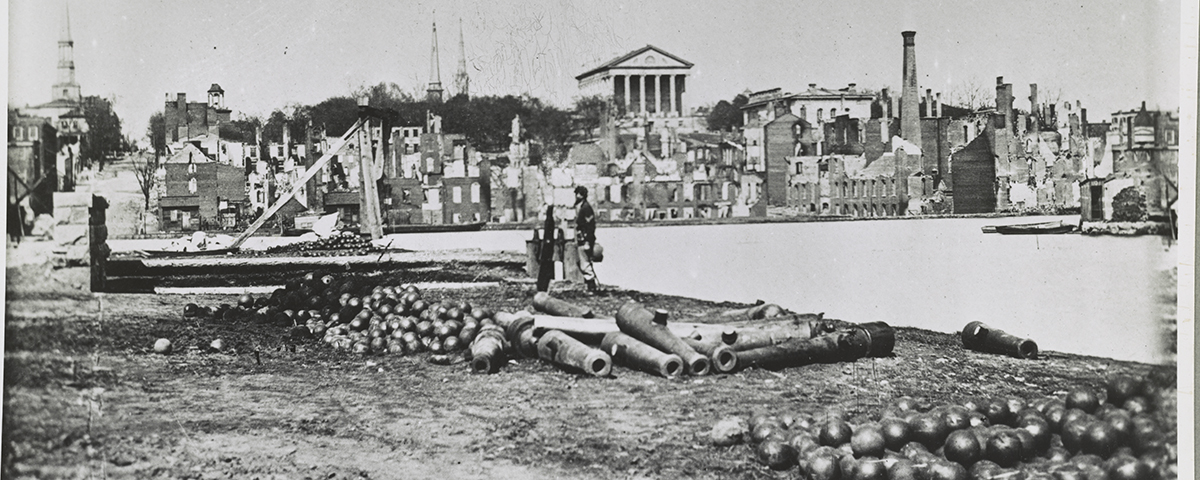Author created ‘Lost Cause’ myth that underpinned Jim Crow
AMERICAN SCHEMERS
EDWARD POLLARD was a newspaperman, a lawyer, a congressional clerk, a prisoner of war, and a bigamist. However, the Virginia native won fame as a defender of slavery, as a propagandist for white supremacy, and as creator of the “Lost Cause” mythology that soothed Southern psyches after the Civil War and suffused Southern politics for a century.
Born in 1832, Pollard grew up watching slaves toil on his family’s two plantations. Upon graduating from the University of Virginia in 1850, he studied law at William and Mary until that college expelled him for misbehavior. He went west to get in on the gold rush. When that didn’t pan out, he took up reporting, writing dispatches from California, the Caribbean, and Asia. Returning to America, he became a lawyer and landed a sinecure as clerk

of the U.S. House of Representatives Judiciary Committee. In 1859, he wrote a pugnacious defense of slavery, Black Diamonds Gathered in the Darkey Homes of the South. “The American institution of slavery does not depress the African,” Pollard wrote. “It elevates him from the condition of a nomad, a heathen, a brute to that of a civilized and comfortable creature and gives to him the precious treasure of a saving religion.”
Pollard wrote that he loved his family’s “happy, contented” slaves and that he had shed copious tears over his black Mammy’s grave. “I love the simple and unadulterated slave, with his geniality, his mirth, his swagger and his nonsense,” he wrote.
But there were limits to this proprietary affection: “When I see a slave above his condition, or hear him talk insultingly of even the lowest white man in the land, I am strongly tempted to knock him down.”
Black Diamonds won Pollard a taste of literary fame. He soon married. His wife died in July 1860. Four months later, Abraham Lincoln was elected president and Pollard wrote The Southern Spy, a broadside of a book in the form of nasty letters to Lincoln. “The South does not fear you,” Pollard proclaimed. “The Union is lost forever.”
When war began, Pollard moved to Richmond, married an Englishwoman, and became an editor at the Richmond Examiner.
A fast, facile writer, Pollard chronicled the war in books he churned out year by year during it. In 1864, angling for overseas sales, he boarded a blockade runner bound for England. A U.S. Navy vessel seized the Confederate ship. Arrested, Pollard spent weeks jailed in Boston before being paroled to live with relatives in Brooklyn.
Early in 1865, he returned to Richmond. He watched the Union army capture the city and harangued street-corner crowds, urging fellow secessionists to fight the Yankees. Not surprisingly, the Yankees threw him in jail. After his release, he deserted his wife and fled to Memphis. He took up with another woman, deserted her, and, without dissolving his marriage, wed a divorcee. Amid these erotic adventures, he managed to write the book that made him notorious—The Lost Cause.
Published in 1866, Cause devotes most of its 750 pages to Civil War battles. Though unabashedly pro-Confederate, its military history is reasonably accurate. Otherwise, the book is an atrocious cornucopia of the crackpot ideas modern historians call “the Lost Cause mythology.”
Neither slavery nor secession caused the Civil War, Pollard wrote. Instead, he blamed the inevitable clash of “opposite civilizations”—the “coarse and materialistic” society of the North steamrolling the “noble” South, a “feudal” culture “of scholarship and manners.” Slavery was wonderful, inculcating “chivalry” in whites and protecting “the Negro in life and limb and in many personal rights.” Blacks were “lazy and unreliable” but when enslaved exhibited “cheerfulness and contentment” and eagerly supported the Confederate cause.
The South’s “better men” would have triumphed, Pollard claimed, except that the Union army, filled with “rowdies and roughs of the Northern cities,” overwhelmed the outnumbered Confederates. Winning its “war of subjugation,” the North tormented the former Confederacy with Reconstruction policies designed to “Africanize the South” and create “mongrelism.”
Pollard’s book proved enormously popular. Readers bought more than 50,000 copies of the first edition; subsequent printings sold well in America, England, and France. Pollard’s preposterous portrait of genteel aristocrats, mindlessly happy slaves, and evil carpetbaggers was a balm for Southerners depressed by defeat. Northerners fell for his palaver, too. His stereotypes became Americana, recycled for decades in textbooks, novels, and Hollywood hits like The Birth of a Nation and Gone with the Wind.
And Pollard wasn’t done. In 1868, while battling his third wife in a nasty divorce, he wrote The Lost Cause Regained. This sequel—a campaign document for Horatio Seymour, that year’s Democratic candidate for president—was as influential and nefarious as the original. Regained proclaimed “the inferiority of the Negro” and predicted that “Negro suffrage” would imprison “white people in the valley of humiliation and death.” But Pollard saw hope. “The true cause fought for in the late war has not been lost,” he wrote. That “true cause” wasn’t slavery; it was “the supremacy of the white race.”
If Northern and Southern whites united behind the Democratic Party, Pollard wrote, they could end Reconstruction and restore “the grand and august theory of co-equal sovereign states.” To Pollard and the Democrats, “states’ rights” included Southern states’ “right” to pass laws disenfranchising black people. The happy result, Pollard wrote, would be “the South still retaining the Negro as a laborer, and keeping him in a condition where his political influence is as indifferent as when he was a slave.” Pollard’s suggestion to his fellow Democrats: “White is the winning word, and let us never be done repeating it. The very word moves the instincts of the voting population of the North.”
That didn’t work in 1868: Seymour lost to Ulysses S. Grant. And Pollard never did see a Democrat in the White House. He died in Virginia in 1872.
However, Pollard’s Lost Cause Regained strategy outlived him by nearly a century. Democrats in the South advertised themselves as “the white man’s party.” They fought Reconstruction, compelled Republicans to withdraw federal troops from the region, and, under the banner of “states’ rights,” legislated segregation, denied black Americans the vote, and shored up white supremacy.
Pollard’s scheme worked as planned until the 1960s, when Democrat Lyndon Johnson signed the Civil Rights Act and the Voting Rights Act. Since then—in an irony that might have amused the man who conjured up the “Lost Cause”—white Southerners have voted overwhelmingly Republican.





